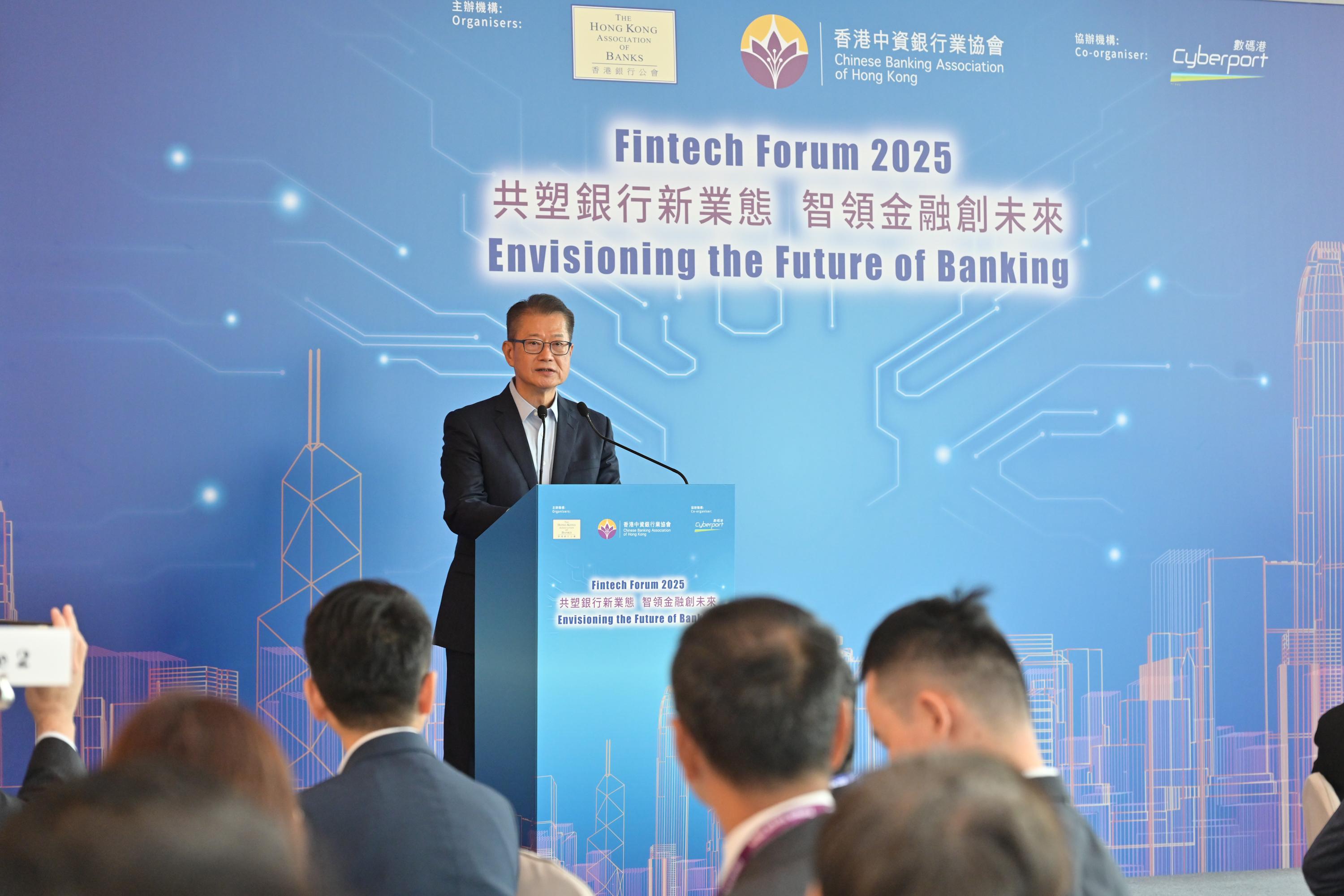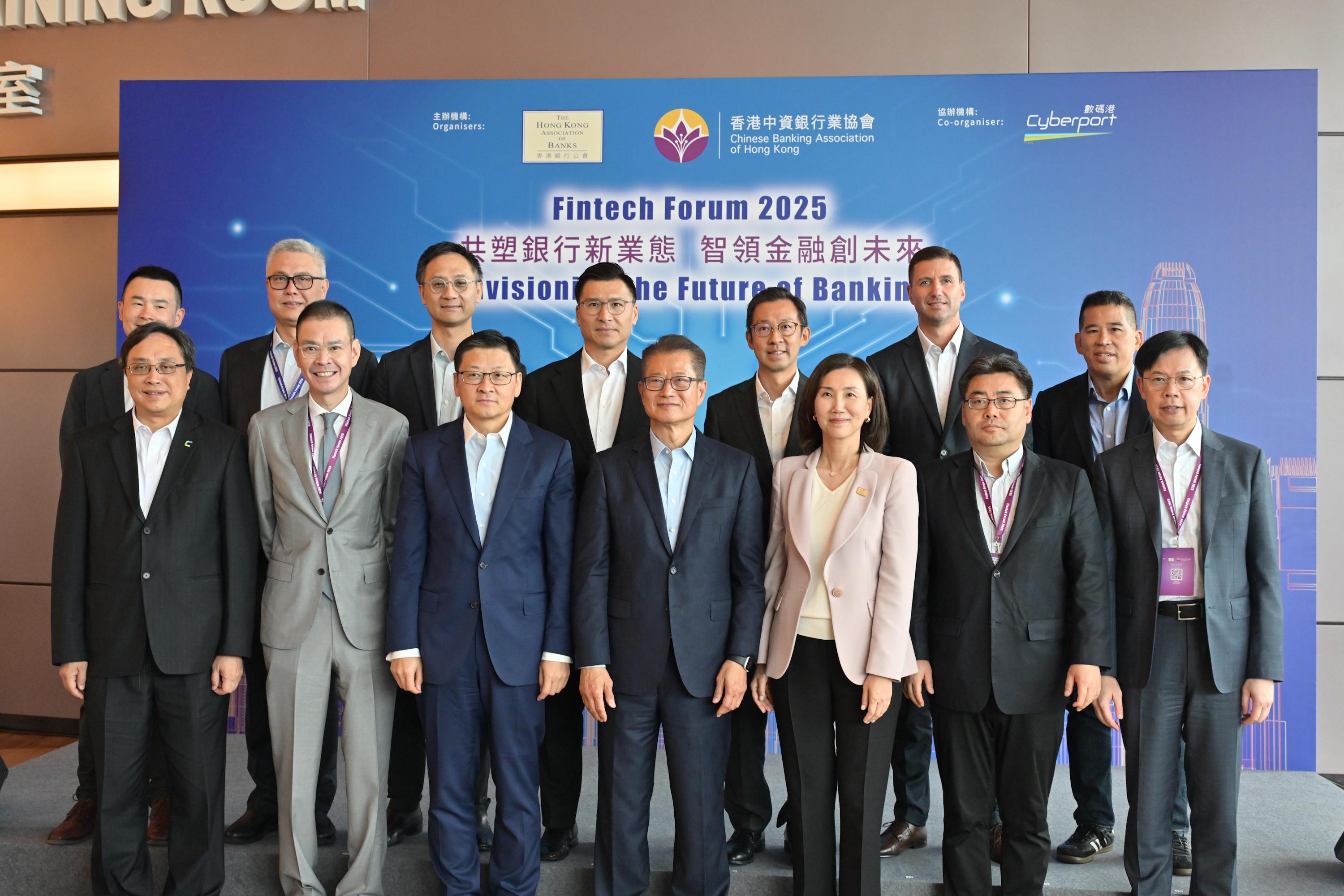Speech by FS at Fintech Forum 2025: Envisioning the Future of Banking (English only) (with photos)
******************************************************************************************
徐衞剛部長 (Director-General of the Economic Affairs Department of the Liaison Office of the Central People's Government in the Hong Kong Special Administrative Region, Mr Xu Weigang), Mary (Chairperson of the Hong Kong Association of Banks, Ms Mary Huen), 孫總 (Chairman of the Chinese Banking Association of Hong Kong, Mr Sun Yu), distinguished guests, ladies and gentlemen,
Good afternoon. It is a great pleasure to speak to you, today, at this luncheon. I know most of you have already had a full and rewarding morning, and are no doubt looking forward to a fortifying lunch. With that in mind, I will keep my remarks brief and focused.
I understand that Eddie (Chief Executive of the Hong Kong Monetary Authority (HKMA), Mr Eddie Yue) shared his perspectives on fintech regulation this morning, including the progress of a number of regulatory initiatives. Allow me to take a step back, outlining the Government's overarching vision for advancing financial innovation in Hong Kong.
Pro-innovation approach
First, the Hong Kong SAR Government is pro-innovation and pro-tech.
We all recognise that technologies are disrupting and reshaping the landscape of finance. From blockchain to artificial intelligence, these innovations allow financial transactions and settlements to be delivered faster, cheaper and more transparently. Yet, as with all transformative technologies, they also come with risks, presenting challenges to investor protection, cybersecurity, even financial security. Around the world, governments and financial regulators face the same fundamental question: to what extent, and at what pace, should we embrace innovative technologies?
For Hong Kong, the answer is clear. As a leading international financial centre, embracing new technologies is not an option. It is a necessity. To stay ahead of the curve, we must be proactive.
Our regulators play a facilitating role in driving financial innovation. A good example is the "regulatory sandboxes" implemented by our financial regulators. They allow innovators to test new technologies in a controlled setting, receiving timely regulatory feedback and refining their solutions before wider adoption. Through sandboxes, regulators and innovators collaborate, even working together to create new solutions.
Consider Project Ensemble. It enables industry participants to work with regulators, exploring tokenised asset use, assessing interoperability across platforms and helping define common industry standards. And it involves not only local parties but also overseas partners for cross-border use cases. As technologies evolve, so too must our platforms for experimentation. Over the past year, for example, the HKMA has introduced a sandbox for generative AI applications, as well as an incubator for distributed ledger technology.
These initiatives send a clear message to the market: that we welcome disruptive innovation, while ensuring that risks are identified and managed responsibly. This enables their adoption at scale, and with confidence.
Regulators and market enablers
That brings me to my second point: the role of our financial regulators.
In Hong Kong, regulators are entrusted with a dual mandate. They are not only supervisors who ensure regulatory compliance, but also enablers helping to shape the future of finance. This dual role is a defining feature of our regulatory philosophy.
Take the SFC (Securities and Futures Commission) for example. More than a regulator, it has been instrumental in driving a series of reforms to our stock market - going back to 2018. In fintech, the SFC is the regulator of digital-asset trading platforms. But it also works to expand digital-asset products for trading and listing.
As for the Hong Kong Monetary Authority, which leads Project Ensemble, it has issued two batches of tokenised green bonds worth HK$6.8 billion over the past two years, making Hong Kong one of the first governments in the world to issue such bonds. I'm pleased to note that preparations for a third batch are already under way.
Together, the Government and regulators lead by example, demonstrating Hong Kong's commitment to driving innovation in the financial sector.
Playing to our strengths
The third point I wish to emphasise is the importance of playing to our strengths.
Hong Kong is Asia's leading international financial centre. We are home to 70 of the world's top 100 banks and six of its top 10 insurers. And they are supported by a dynamic network of asset managers and professional service providers. Our regulatory standards align with the highest international benchmarks, and we contribute to global standard setting via international bodies such as the IOSCO (International Organization of Securities Commissions).
This combination of global connectivity, deep liquidity and world-class expertise makes Hong Kong an ideal environment for fintech development. For start-ups and innovators, launching here is effectively an international seal of approval: if a solution works in our sophisticated, well-regulated, globally connected market, it is far more likely to succeed elsewhere.
And it all comes together thanks to our "one country, two systems" framework, enabling Hong Kong to provide unparalleled connectivity between the Chinese Mainland and the rest of the world. That singular advantage also allows Hong Kong to be a natural testing ground for new technologies looking to expand into this region.
The "Connect Schemes" perfectly illustrate innovative cross-border financial collaboration. Starting with equities and now including bonds, ETFs and derivatives, they allow international investors to participate in Mainland markets, and Mainland investors to access global opportunities, through a closed-loop system - an innovation only Hong Kong can deliver.
And I believe there is plenty of room for Hong Kong to serve as a two-way platform for fintech solutions as well.
On digital assets
Let me now turn to digital assets, where Hong Kong has emerged as a pioneer.
Over the past few years, we have been building regulatory regimes that encourage tech innovation with suitable guardrails. From the two policy statements on digital assets released over the past couple of years, to the enactment of the Stablecoin Ordinance, and our recent consultation on over-the-counter dealing and custodian service, our trajectory has been clear and consistent.
A few points are worth reiterating. First, we follow the "same activity, same risk, same regulation" principle, ensuring a transparent, fair and risk-based regime that adapts to innovation while protecting investors, consumers and financial security.
Second, we believe digital assets should serve the real economy. This is evident in the regulation of stablecoins, where licences will be granted only to applicants who can demonstrate real-world use cases with a convincing and sustainable business model.
Third, building a vibrant ecosystem. Over the years, we have put in a holistic and forward looking strategy for digital assets. It goes well beyond regulation to broadening product offerings, modernising infrastructure, advancing cross-boundary use and nurturing talent - all aimed at enabling the sustainable and responsible development of our digital-asset sector.
Looking ahead
Ladies and gentlemen, allow me to share two more points about fintech development down the road.
First, artificial intelligence. When combined with blockchain and other emerging technologies, AI holds immense potential to transform financial services. Streamlining compliance, enhancing customer service, improving credit scoring and risk management are just a few examples of AI's promise. We believe there is substantial potential for AI to go further, to make financial services more efficient, inclusive and accessible.
A survey conducted by the HKMA's Academy of Finance last year revealed that 75 per cent of Hong Kong's financial institutions are already using or planning to use generative AI in their operations. This is a compelling indicator of how quickly the technology is being adopted here.
The Government has prioritised AI as a core industry under a broader "AI+" strategy, which seeks to embed AI across every sector of the economy. We are working to attract enterprises and talent, and we encourage cross-sector collaboration between AI and the financial services industry.
As with any new technology, we also recognise the challenges AI may pose to financial services and the economy in general. That's why, last October, we issued a policy statement on the responsible application of AI in financial markets. It sets out a "dual track" approach: promoting adoption while addressing risks such as cybersecurity, data privacy and intellectual property protection. We are also carefully assessing its impact in areas such as job displacement.
My second point is that our fintech solutions must look beyond Hong Kong's borders.
Hong Kong is already home to more than 1 100 fintech companies, ranging from digital banks to regtech providers. Many of these firms are expanding into Southeast Asia and across the Global South, where demand for innovative financial solutions is accelerating.
The Government actively supports this process. For example, the Hong Kong Investment Corporation partners with fintech companies to support their overseas ventures. And an increasing number of Mainland fintech firms are using Hong Kong to showcase and export their technologies to the world.
By helping them expand globally, we strengthen our own fintech sector, while contributing to financial inclusion and the region's economic development.
Concluding remarks
Ladies and gentlemen, innovation inevitably carries risks, but those risks must not deter us from the progress it presents. As the Chinese saying goes: 無限風光在險峰, or as translated: perilous peaks offer the best scenery.
Let us work together to ensure that Hong Kong continues to shine as a global beacon of financial innovation and the wide-ranging prosperity it promises.
Thank you.
Ends/Thursday, August 28, 2025
Issued at HKT 15:20
Issued at HKT 15:20
NNNN




